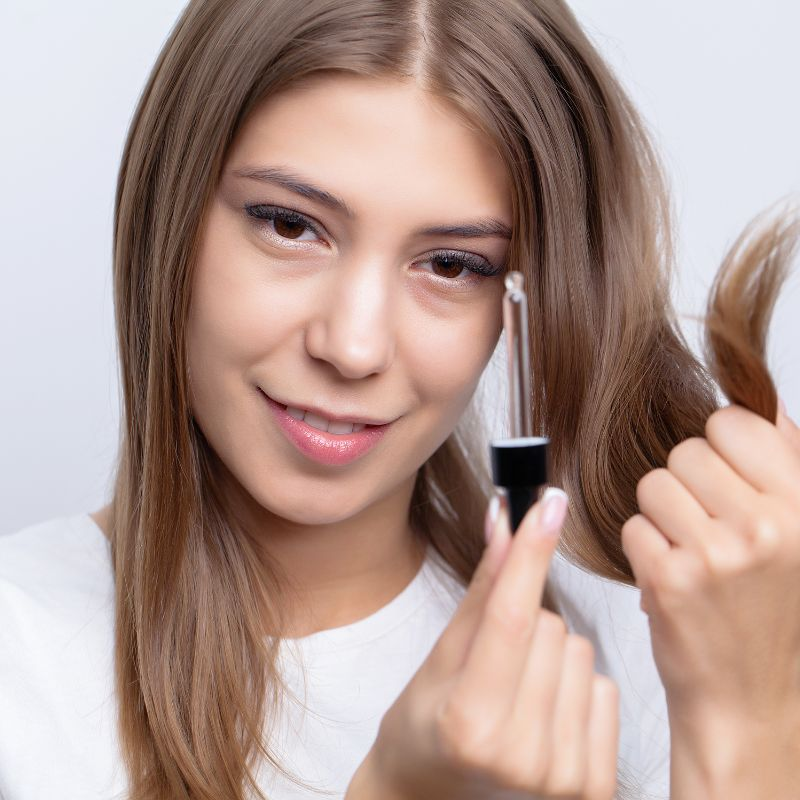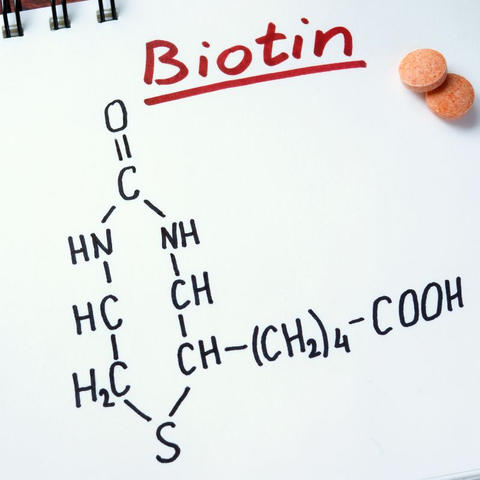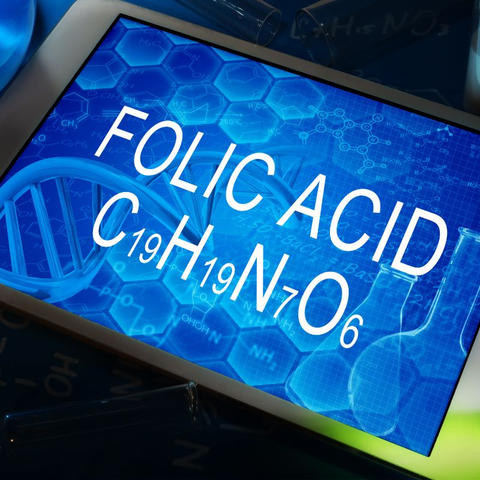

· By Lorea Lastiri
Best Vitamins for Hair Loss: What Works to Regrow Hair and Prevent Thinning!
The very thought of your hair thinning or, worse, falling out can be pretty unsettling. For many people, their hair is an integral part of their personality, and losing them can be quite a traumatic experience.
However, over 80% of men and over 50% of women experience this problem, which makes it even more alarming.
While it is perfectly normal to lose about 50-100 hair daily, losing lumps of hair leading to visible thinning is where the alarm bells should ring. Hair thinning and hair fall can happen due to many reasons, like stress, medical conditions, and nutritional deficiencies, especially vitamin deficiencies.
Vitamins do great wonders for your hair. From nourishing the follicle cells to protecting them from free radicals, vitamins play a vital role in every aspect of hair health. Including or supplementing these vitamins can help prevent hair loss and even stimulate regrowth.
But what vitamins are best for your hair? That’s what we will be discussing in this article. We will cover every detail, from the vitamin's role to the best way to take it.
Vitamin B complex
The B vitamins are water-soluble micronutrients that play critical roles in regulating physiological function. From DNA synthesis to energy production, you can find these vitamins involved at every level of cellular function.
Regarding hair, some members of this family have a more significant role than others. Some of the most essential B-complex vitamins that help prevent hair loss and thinning include:
Biotin or vitamin B7

Biotin or vitamin B7 is one of the most essential B complex vitamins, which is crucial in metabolic reactions. It acts as a coenzyme in the metabolic processing of fatty acids, carbohydrates, and amino acids.
In other words, Biotin helps regulate how your cells generate energy and utilize the raw materials to support hair growth.
The role of Biotin in hair health comes during the production of keratin—a critical structural component of your hair shaft. Numerous studies have found that a deficiency in Biotin often leads to thinning of hair and hair loss.
According to a 2016 study published in the International Journal of Trichology, 38% of women experiencing hair loss in the study group were deficient in Biotin.
Supplementation with this vitamin's bioavailable and easily absorbable form can help prevent hair loss and even promote hair regrowth.
Biotin directly helps the quality of your thinning hair by being involved in the production of essential amino acids needed for keratin synthesis.
With sufficient amino acids, your body can make more high-quality keratin for those lustrous locks. It prevents hair thinning and can also stimulate hair growth.
Niacin or Vitamin B3
Niacin is a crucial component of the energy production mechanism of a cell. Apart from its metabolic functions, Niacin also has a proven ability to enhance the fullness and texture of your hair. The effect is attributed to the ability of the vitamin to promote keratin biosynthesis.
Another property of this B-complex vitamin that may have a role in promoting hair health is vasodilation. Niacin causes the capillaries around the follicles to dilate, improving blood circulation to the growing follicular cells.
It brings more oxygen and nutrients to the cells, creating a perfect environment for hair regrowth.
Including this key vitamin in your diet or adding it as a dietary supplement can help prevent thinning and stimulate healthy hair growth.
Folic acid or vitamin B9

Folate, or vitamin B9, is one of the most well-known vitamins in the B complex. It is well known for its cell growth-stimulating role. It is thought to improve your hair health by stimulating the active cells in hair follicles to produce new cells.
The vitamin supports the follicle during its lifecycle's Anagen (growth) phase. It also ensures that your follicle does not enter into the telogen or resting phase prematurely. The result? Fuller-looking, lustrous hair that beams with health.
Pyridoxine or vitamin B6

A less-known member of the vitamin B family, Pyridoxine is known for its role in protein biosynthesis. It also allows folic acid and vitamin B12 to do their job efficiently and synergistically.
When you have sufficient vitamin B6 in your body, your hair looks healthy and happy.
Pantothenic acid or vitamin B5
Yet another critical vitamin within the B complex group, Pantothenic acid, helps stimulate hair growth. Vitamin B5 is a crucial component in the breakdown of fats and carbohydrates into energy that gets utilized by the hair follicles, furnishing the necessary source of energy for the growth process.
It also participates in the collagen balance of the skin, which then results in hair growth.
In addition, Vitamin B5 helps fortify hair follicles and improve hair flexibility, texture, and radiance, preventing damage to the hair, such as tearing and loss.
Adding vitamin B5-rich foods like mushrooms, avocados, eggs, and broccoli to your diet can contribute to hair health improvement.
Cobalamin or vitamin B12
Cobalamin is predominantly involved in hemoglobin synthesis. When you have sufficient of this red pigment in your blood, its oxygen-carrying capacity is improved.
With proper levels of Cobalamin, your body makes enough red cells to carry oxygen to your scalp and hair follicles. It prevents malnourishment of the follicles and hair thinning and is known to support hair growth.
Several studies have proven the benefits of these vitamins in preventing hair thinning and hair fall. More importantly, when your body lacks one or more of these vitamins, your hair starts to suffer.
That said, picking the correct formulations of these vitamins is essential to get the best hair-protective effects. WhyNotNatural’s B Complex Liquid with all 8 B-complex vitamins is a great way to give your body what it needs in a form that it can absorb.
The all-natural, vegan formula ensures that the vitamins are quickly absorbed in your body to get the best results.
Vitamin E
Also called Tocopherol, vitamin E IS one of the best vitamins for healthy skin and hair. Being a powerful antioxidant, this vitamin scavenges free radicles in your cells, protecting them from oxidative stress. No wonder it is one of the most popular hair growth supplements.
As your follicles are more prone to the oxidizing effect of free radicals, vitamin E can exert a protective effect by neutralizing them. With fewer radicals interfering with cellular function, your follicles can produce thicker, healthier hair.
Vitamin E also improves the blood circulation in your scalp, which is believed to support hair growth. The enhanced circulation allows more blood, nutrients, and oxygen to be delivered to the growing cells, keeping them nourished.
Several studies support this hair-protective function. According to a 2010 study, the number of hair in the group of people receiving vitamin E hair supplements increased by 34.5% compared to the placebo group. The study concluded that the antioxidant property of vitamin E was largely responsible for stimulating healthy hair growth.
Another way this vitamin can prevent hair thinning and hair fall is by improving the health of your scalp skin. Vitamin E prevents scalp drying by promoting the release of natural oils and maintaining your skin's barrier integrity.
A healthy scalp is necessary for healthy hair; vitamin E hair growth supplements can help with both.
Calciferol or Vitamin D
Known as the sunshine vitamin, vitamin D involves many biological functions. Besides helping you get strong bones and radiant skin, vitamin D is also essential to maintain healthy follicles and prevent hair thinning.
According to a 2008 study, the receptors for vitamin D are crucial for regenerating follicles. A lack of this critical vitamin micronutrient can cause your hair follicles to atrophy, leading to accelerated hair loss.
In another study, a group of scientists from India found that low levels of vitamin D3, the active form of this vitamin, can result in diffuse hair loss. The authors found that hair loss increased in stressed subjects, noting that stress and lack of vitamin D3 are a lethal combination of hair health.
Another study conducted in 2016 found that people with a specific type of hair loss called alopecia areata had lower levels of vitamin D3 in their serum. While the authors could not find a causal relationship between the low D3 levels and hair loss, they did find that both are correlated.
There is also mounting evidence that vitamin D3 is involved in the growth and development of keratinocytes, the cells responsible for producing keratin.
In light of all these scientific studies, it is safe to say that vitamin D is one of the most important nutrients that prevent hair fall and support hair growth.
Adequate levels of this vitamin are necessary for healthy hair and skin, and supplementation can be a great option. WhyNotNatural’s Organic Vitamin D3 Liquid Drops with K2 is an excellent option if you are looking for a natural, readily bioavailable supplement.
Also read: Understanding Vitamin D Deficiency: Causes, Symptoms, and Remedies.
Vitamin A
The role of vitamin A in vision is very well-known, but did you know it is responsible for the repair and maintenance of your damaged follicles?
Vitamin A can prevent hair loss and promote hair growth when taken in the right dosage. Vitamin A carries out three functions to maintain healthy hair. They are:
- Stimulates sebum production
- Helps in hair follicle cell growth, and
- Carries out repair and maintenance activity in active hair roots
Sebum is the oily liquid that oozes out of your skin pores, which reinforces the skin's barrier properties. It keeps the skin and hair moisturized, preventing premature hair breaking and hair fall.
Vitamin A also regulates the cell growth. It helps regenerate hair roots and supports them during the growth phase. A deficiency in vitamin A can cause thinning and hair loss.
A 2015 study confirmed the role of this vitamin in regulating the hair cycle. The researchers found that vitamin A supplementation activates the hair stem cells and induces the development and growth phase of the hair cycle.
Get the WhyNotNatural Organic Vitamin A supplement. It is completely vegan and will aid your hair growth.
Ascorbic acid or Vitamin C
The citrous vitamin, as it is popularly called, stands out not only for its antioxidant role but also for its role in preventing and treating hair loss. As a good antioxidant, ascorbic acid neutralizes the free radicals and prevents oxidative stress.
As follicles are rapidly dividing cells, they are more prone to oxidative damage. Vitamin C supplementation can neutralize free radicals, protecting the cells from this damage.
Vitamin C also directly governs collagen synthesis, a protein crucial to the structural integrity of the hair. Collagen reinforces your hair shaft and gives it the strength to sustain damage and wear.
Several studies have shown that Ascorbic acid can stimulate collagen synthesis, supporting healthy hair growth from within. Having plenty of vitamin C prevents split ends and hair breakage, giving you thicker hair.
Apart from its antioxidant and collagen-stimulating role, this vitamin is also essential in iron absorption. Iron deficiency is known to accelerate hair loss; a lack of vitamin C can exaggerate this deficiency.
By allowing your body to absorb iron better, vitamin C indirectly prevents hair loss. This synergistic effect of iron and vitamin C is utilized in several hair growth supplements.
You may also like: What Foods Contain Vitamin C?
Essential minerals
Apart from the vitamins we discussed, various essential minerals also play a key role in maintaining hair health. Some of the most important ones include:
Iron
Iron is integral to your hair health. It helps supply oxygen to the hair roots, which encourages hair growth. Iron deficiency, one of the core factors for hair thinning, can be prevented when you consume enough of this vital element.
Iron-rich foods like spinach, lentils, and red meat help to support the overall health of the hair, contributing to a fuller and lustrous mane.
Zinc
Zinc is another active player in the process of protecting hair. It enhances tissue growth and repair near the hair roots to ensure proper sebum secretion from the oil glands.
Zinc deficiency is known to be a factor directly connected to hair loss. The intake of zinc via supplements or zinc-rich food such as oysters, beef, and pumpkin seeds can protect your hair from thinning and promote hair regrowth.
Selenium
Selenium provides efficient antioxidant properties, preventing oxidative damage caused by the environmental elements and free radicals in the hair cells. This protection extends to the scalp and hair cells, protecting against hair loss.
Although these minerals are essential for hair, they are important to achieve balance. Like any other health supplement, you must consult your physician before starting mineral supplements.
Are hair growth vitamins safe?

Generally, hair growth vitamins should be safe for most people if taken accordingly and in the recommended dosage. Nevertheless, as with all supplements, they have the potential to have side effects in some individuals.
For example, an excess of vitamin A can invite toxicity, causing dry skin, headaches, and blurred vision.
The question of hair growth vitamins-medication interactions is another focus of attention. For instance, vitamin E, which is known for its antioxidant properties, can thin the blood. Hence, it may interfere with anticoagulant medicine such as warfarin.
Furthermore, zinc hair growth supplements may decrease the proper function of antibiotics that you take at the same time.
It draws attention to the fact that even supplements might interact with certain medications, hence the necessity to seek expert medical advice before starting any new supplement regimen.
Importance of choosing the right hair growth supplement
The Food and Drug Administration (FDA) typically does not approve dietary supplements for safety or efficacy before their availability to the general public.
Instead, the manufacturers of these supplements guarantee the safety of their products and that the claims made about them are based on sufficient substantial evidence.
This regulatory framework has been fraught with issues like the quality and composition of dietary supplements, which include hair growth vitamins.
Mixing up product labels and heavy metals, pesticides, and other harmful substances have been detected at some stages of production.
Choosing hair growth vitamins from credible manufacturers with detailed labeling of ingredients and quality assurance is the best way to ensure product quality.
Additionally, it should be stressed that hair growth vitamins should be used as a complementary approach to overall hair health, including a balanced diet, addressing underlying health issues, and proper hair care that contributes to hair loss.
WhyNotNatural provides 100% natural vitamin supplements that are organic and made without artificial fillers and chemicals. Please check out our full range of supplements today!
How can I regrow my lost hair?
While regrowing your hair is sometimes possible, your success rate will depend on the underlying cause of the hair loss. Genetics, hormonal imbalances, nutritional deficiencies, and certain medical conditions can all contribute to hair loss.
That said, here are a few ways you can begin your hair growth journey:
Optimize your diet
Nothing is as monumental to your hair health as your diet. Make sure that you are eating a balanced diet that is rich in vitamins and fiber. Nutrients like vitamins A, D, Biotin, and iron support hair health and prevent hair fall.
If you are not able to meet your vitamin requirements through diet alone, consider getting high-quality hair growth supplements. Including a hair growth supplement might help your follicles get the proper nutrition they need.
Keep your scalp healthy.
To regrow your lost hair, you must keep your scalp healthy. When using haircare products, make sure to use sulfate-free formulations. Choose natural ingredients like tea tree oil rather than harsh chemicals to remove build-up from your scalp.
Avoid harsh treatments and chemicals at any cost. Heat styling tools and tying your hair too tight can contribute to hair loss and prevent hair growth.
Advanced hair loss treatments
Treatments like low-level laser therapy (LLLT), platelet-rich plasma (PRP) injections, and hair transplant surgery are the ultimate solutions to regrowing your hair.
- LLLT devices are among the most popular therapies to promote hair growth, e.g., laser combs and helmets. Research points out that LLLT may be an effective remedy for the hereditary form of male-pattern baldness, though devices must still be used regularly for months to get the results.
- PRP therapy is a process of injecting your own platelets into your thinning follicles to induce hair growth. This procedure can be effective for specific types of hair loss problems for density improvement.
- The hair transplant surgery offers a more long-term solution as the hair with follicles are moved from one part of the head to the areas of the scalp exhibiting bald spots or thinning. Procedures such as Follicular Unit Transplantation (FUT) and Follicular Unit Extraction (FUE) may give natural looks. However, the costs and the recovery time after them are on the higher side.
When do I see a doctor for my hair loss?
Everyone loses hair daily. However, if you experience noticeable thinning, it might be a good idea to visit a dermatologist to find out the root cause of the problem.
Here are some symptoms and situations that warrant a visit to your doctor for hair loss:
An almost overnight or rapid hair loss
If you notice a dramatic increase in hair shedding or develop bald patches, it is vital to visit the physician as soon as possible. Alopecia areata is one such condition that manifests with the sudden appearance of patches of hair loss.
The other one is telogen effluvium, which results from a stressful event.
Patterned hair loss
Pattern baldness, also called androgenetic alopecia, is the main type of hair loss in males and females, but the baldness pattern differs in men and women.
Men usually have an increasing widening of the hairline and bald spots, whereas women usually notice a broader partition of the hair.
This kind of hair fall is either genetic or resulting from certain medications but, in some cases, is slowed or even reversed by medical treatments.
Hair fall accompanied by scalp irritation, burning, or rash
When hair loss is combined with scalp discomfort and visual alterations like redness, scaling, or rashes, it could be a sign of infection or a skin condition like dermatitis.
In some cases, it may even cause impermanent hair loss and scarring, which will be aggravated if the disease is not treated promptly.
Hair thinning with other issues
Hair loss that coincides with additional signs, for example, tiredness, weight loss, or irregular periods, likely points to a hormonal imbalance or thyroid disorder. The conditions are manageable, and proper care can often cause hair to regrow.
If you had no success with other treatments
If you have tried minoxidil (Rogaine) for several months but have no visible result on your hairline, you may consider booking an appointment with a doctor for other treatment options.
If it becomes clear that your hair loss is caused by prescription drugs, specialized treatments, or even dietary changes, your doctor might help you regrow your hair.

Takeaway: Prevent thinning and regrow hair with vitamin supplements
Vitamins play a crucial role in protecting and maintaining the health of your hair and follicles. Supplementing with vitamins A, D, E, and C helps your follicles create stronger and healthier hair.
Ample studies have shown that hair vitamin supplements help prevent thinning and stimulate hair growth. However, it is important to choose the right vitamins for the best results.
You must also use vitamin supplements that are easy to absorb, natural, and free from artificial chemical additives.
Check out WhyNotNatural’s meticulously crafted line of vitamin supplements. We have a commitment to 100% natural ingredients and innovative liquid formulation for maximum absorption and effectiveness. Explore our full range of products and begin your journey to healthy, lustrous hair.
Don't forget to subscribe to our newsletter to learn which supplements to take, how to combine them for maximum benefit, and other health tips to boost your energy and vitality. Plus, discover natural strategies to reduce hormonal imbalances, stress, and anxiety. Click here to get started!
